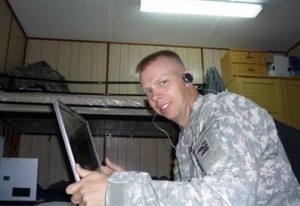Staying in touch with loved ones
World War II had its “V-mail” – photographed, miniaturized letters both to and from servicemen. Today’s war has e-mail. “In Iraq, there were guys who’d been in for more than 20 years who would constantly give us young guys crap,” about using technology to communicate, says Marcus Penn, a 25-year-old Marine from Beaufort, S.C. “They’d say, ‘When I was in Desert Storm, we didn’t have e-mail. I went for a month and a half without talking to my family.’ We’d say, ‘Welcome to the 21st century.’ ”

“My wife still has my e-mails,” he says. “I sent 1,845 from the day I left to the day I got back. That’s not counting the Google chats.”
Although he was fighting halfway around the world, Penn says Internet access and e-mail helped him feel much less isolated. “Whenever we lost somebody, whenever somebody died, we’d go into communications blackout — it’s part of the military procedure to protect the family until notification is made,” he says. “We’d basically cut off all access to the outside world — no phones, no Internet. And you’d feel that absence. When you’d come out of it, it would be a giant relief. You realized the world was still out there.”
Technology also helped him keep track of important developments back home. “Our daughter was born two months before I left,” he says. “But my wife was awesome about taking pictures and uploading them to Google’s Picasa” photo-sharing site. “She would take about a week’s worth of pictures and then upload them in one big batch. It definitely closed up the distance.”
Techs have made soldiers to contact their family thru emails and chatting anytime. This makes them happy and even the family members will be happy too.
